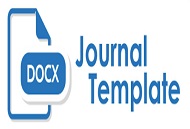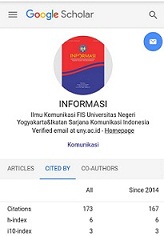MITOS DAN HIPERREALITAS KOMUNIKASI POLITIK (Studi Iklan Pemilu Jusuf Kalla-Wiranto Versi Humble dan Mampu)
DOI:
https://doi.org/10.21831/informasi.v45i2.7988Keywords:
Myth, Hyperreality, Political AdvertisingAbstract
One of the main elements in a modern democratic politics is widespread political advertisement. In the 2009 election in Indonesia, one of the main partner, namely Jusuf Kalla and Wiranto also do advertising, especially on television. This is done to boost the popularity and elektabilitasnya to win the election. And in these ads are myths and hyperreality. This study was conducted to uncover the myths and hyperreality that exist in the ad with the title "humble" and "mampu" belonging to the couple. The method used is semiotic theories of Roland Barthes. with a two-stage approach popularized by Roland Barthes, connotations and meanings denotation, meaning the disclosure of the symbols in advertising will be more striking. From the analysis found that the phrase statesman and populist become the focus of myths and hyperreality conducted by Jusuf Kalla and Wiranto in its advertising.
Salah satu elemen politik dalam demokrasi modern adalah merebaknya iklan politik. Dalam pemilu 2009 di Indonesia salah satu pasangan yaitu Jusuf Kalla dan Wiranto juga melakukan iklan khususnya di televisi. Hal ini dilakukan untuk mendongkrak popularitas dan elektabilitasnya demi memenangkan pemilu. Di dalam iklan tersebut terdapat mitos dan hiperrealitas. Penelitian ini dilakukan untuk mengungkap mitos dan hiperrealitas yang ada dalam iklan dengan judul "humble" dan "mampu" milik pasangan tersebut. Adapun metode yang digunakan adalah teori semiotika Roland Barthes. dengan pendekatan dua tahap yang dipopulerkan oleh Roland Barthes, makna konotasi dan makna denotasi, pengungkapan makna simbol-simbol dalam iklan akan semakin mencolok. Dari analisis didapat bahwa frase negarawan dan merakyat menjadi fokus mitos dan hiperrealitas yang dilakukan oleh Jusuf Kalla dan Wiranto dalam iklannya.
References
Barthes, Roland. 2012. Elemen-elemen Semiologi. Terj. M. Ardhiyansyah. Yogyakarta: IRCiSoD
Barthes, Roland. 1981. Mithologies. New York: Granada Publising.
Darmawan, HBC. 2004. Sang Kandidat; Analisis Psikologi Politik Lima Kandidat Presiden dan Wakil Presiden RI Pemilu
Jakarta: Kompas
Eriyanto. 2011. Analisis Isi; Pengantar Metodologi untuk Penelitian Komunikasi dan Ilmu-Ilmu Sosisl lainnya. Jakarta;
Kencana.
Hasanuddin. 1998. Pengaruh Mitos dalam Karya Sastra Indonesia Warna Lokal Minagkabau. Dalam Majalah Humanus. Lemlit IKIP Padang.
Hartoko, Dicki dan B. Rahmanto. 1986. Pemandu di Dunia Sastra. Yogyaarta: Kanisius.
Jorgensen, Marianne W. dan Louise J. Philips. 2007. Analisis Wacana: Teori dan Metode. Yogyakarta: Pustaka Pelajar.
Junus, Umar. 1986. Mitos dan Komunikasi. Jakarta: Gramedia.
Piliang, Yasraf Amir. 2012. Semiotika dan Hipersemiotika; Kode, Gaya dan Matinya Makna. Bandung: Matahari.
Piliang, Yasraf Amir. 2005. Tranpolitika Dinamika Politik di dalam Era Virtualitas. Yogyakarta: Jalasutra.
Sobur, Alex. 2004. Semiotika Komunikasi. Bandung: Remaja Rosdakarya.
Storey, John. 2004. Teori Budaya dan Budaya Pop, Memetakan Lanskap Konseptual Cultural Studies. Yogyakarta: Qalam.
Sunardi, St. 2007. Semiotika Negativa. Yogyakarta: Kanal.
http://pemilu.okezone.com/read/2009/06/24/268/232551/sering-klaim-keberhasilan-sinyal-jk-otoriter. diakses 17 November 2013.
http://pemilu.okezone.com/read/2009/06/02/268/225309/sederet-tokoh-menjadi-tim-kampanye-jk-wiranto. Diakses 9 September 2014.
http://news.detik.com/read/2009/06/10/064500/1145204/700/ini-dia-tim-sukses-jk-wiranto. Diakses 9 September 2014
Kompas 2 Juni 2009.
Downloads
Published
How to Cite
Issue
Section
Citation Check
License
Authors who publish with this journal agree to the following terms:
- Authors retain copyright and grant the journal right of first publication with the work simultaneously licensed under a Creative Commons Attribution License that allows others to share the work with an acknowledgement of the work's authorship and initial publication in this journal.
- Authors are able to enter into separate, additional contractual arrangements for the non-exclusive distribution of the journal's published version of the work (e.g., post it to an institutional repository or publish it in a book), with an acknowledgement of its initial publication in this journal.
- Authors are permitted and encouraged to post their work online (e.g., in institutional repositories or on their website) prior to and during the submission process, as it can lead to productive exchanges, as well as earlier and greater citation of published work (See The Effect of Open Access).












